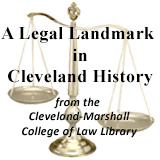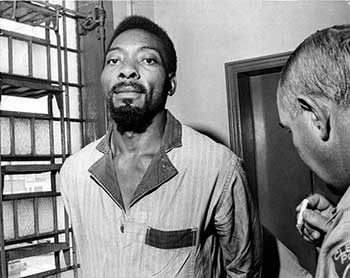The Glenville Shootout and the Trial of Fred Ahmed Evans
Legal Proceedings of Fred Ahmed Evans: Indictment, Arraignment & Pre-trial Motions
Indictment and Arraignment
Following the shoot-out in Glenville, the Cuyahoga County Grand Jury indicted Fred Ahmed Evans and his followers Lathan Donald, John Hardrick, Alfred Thomas and Leslie Jackson with seven counts of first-degree murder in the death of three policemen and a civilian. Each was charged with four counts of first-degree murder and three counts of first-degree murder of a policeman. The indictments were returned after the grand jury heard testimony from approximately thirty witnesses.1
Evans was arraigned in front of Common Pleas Judge August Prayatel on September 11, 1968. Evans pled not guilty on all seven charges of first-degree murder, shooting with intent to kill or wound, possession of a machine gun, and possession of narcotics.2
Pre-trial Motions
Evans' attorneys vigorously defended their client by filing a series of motions (formal requests) to the court. Defense attorneys Stanley Tolliver and Charles Fleming asked Judge George McMonagle to suppress, or remove from the record, oral statements made by Evans following his arrest. The basis for Evans' request was that he had asked for a lawyer when he was interrogated at the police station. Yet police continued to question him without an attorney present in violation of his constitutional rights. The judge ruled that any statements made by Evans prior to the arrival of counsel would not be admissible. The judge's ruling eliminated testimony of a Cleveland Police Detective Carl Roberts, who quoted Evans as saying "I shot at every white person I saw and if my damned carbine hadn't jammed, I'd still be shooting."3
Judge McMonagle did permit remarks made by Evans at the scene of the shoot-out to become part of the record. A rifle found at the scene was included into evidence because Evans told police where to find it.4
The defense filed a motion requesting three of the seven murder indictment counts be dismissed. They argued that Evans would be placed in double jeopardy by having two murder counts assigned to the deaths of each policeman. Judge McMonagle denied the motion.5
Finally, the defense filed a motion to move Evans' murder trial to another county; they claimed "the climate created by this publicity makes it impossible to get a fair trial." Judge McMonagle denied the motion, assuring both parties that they would get a fair trial in his courtroom.6
1Terence Sheridan, "Evans, 4 Others Indicted by Jury," Plain Dealer, Aug. 28, 1968.
2"3 Plead Not Guilty in 4 Sniper Murders," Plain Dealer, Sept.12, 1968.
3Edward P. Whelan, "Evans' Lawyers to Hear Tapes of Police Radio," Plain Dealer, Mar. 19, 1969.
4 Edward P. Whelan, "Judge Bars Ahmed Statements From Testimony," Cleveland Press, Mar. 20, 1969.
5Tony Tucci, "Judge Won't Dismiss 3 of Evans' Charges," Cleveland Press, Mar. 26, 1969.
6Tony Tucci, "Judge Won't Move Ahmed Evans' Trial," Cleveland Press, Apr. 10, 1969.





